The role of artificial intelligence (AI) is becoming increasingly important as businesses and individual professionals strive for greater agility and efficiency. AI tools are increasingly being used to boost productivity and streamline business operations. AI is changing the way we work, from AI-powered content creation and sentiment analysis to image/video generation and predictive analytics. This article investigates the best AI tools available to assist you in optimizing productivity across multiple fronts.
Artificial intelligence (AI) technologies have opened up a slew of new doors for businesses of all sizes around the world. AI is providing unprecedented levels of insight and assisting in the optimization of numerous business processes.
There are numerous tools available to help you improve your operations, whether you are a freelancer with a one-person business or in charge of a team of employees.
AI has advanced significantly in recent years and is now used in a variety of fields such as healthcare, finance, and transportation.
Such a high reliance encourages innovation. And that is exactly what we are here to discuss.
AI tools are in high demand due to the numerous benefits you’ve likely heard about by now!
These software-based applications detect and analyze specific online content types such as images, text, and videos from sources such as blogs, social media, and so on.
AI technologies are rapidly evolving, and businesses now have numerous options for increasing productivity. Hundreds of new tools are introduced to the market every day.
We’ve seen the best AI software for video editing, writing emails, recruiting, issue-tracking, sales, and celebrity-voice in recent articles. Let’s take a look at some of the best AI tools for business available today in this article.
Affiliate Disclosure: Some of the links in this article could be affiliate links, which provide $$$ to me at no cost to you if you decide to purchase the tool.
What Are The Best AI Tools for Business?

Here are my top picks for the best AI tools for Business in 2024:
- Pictory
- Writesonic
- Murf
- Flick
- Lovo AI
- Surfer SEO
- Synthesys
- Ocoya
- DeepBrain AI
- Rapidely
- Speechify
- 10Web.io
- Descript
1. Pictory
Best AI Tool for Business

Pictory is one of the best AI business tools that allows you to easily create and edit high-quality videos. One of the best features of the tool is that no prior experience in video editing or design is required.
You begin by supplying a script or article that will serve as the foundation for your video content. Pictory, for example, can convert your blog post into an engaging video for social media or your website. This is a fantastic feature for personal bloggers and businesses looking to boost engagement and quality. It works on any computer because it is hosted in the cloud.

Pictory also enables you to easily edit videos with text, which is ideal for editing webinars, podcasts, Zoom recordings, and other media. It’s easy to use and only takes a few minutes to produce professional results that will help you expand your target market and establish your brand.
Pictory also has the ability to create shareable video highlight reels, which is useful for all those who want to make trailers or share short clips on social media. Aside from these fantastic features, you can also automatically caption and summarize long videos.
FEATURES:

- Script to Video: Pictory converts scripts into videos with images, videos, music, and voiceover.
- Blog to Video: Transforms blog posts into videos by analyzing content and generating scripts.
- Text-Based Video Editing: Edits videos by transcribing, deleting or adding text, and removing noise.
- Video Highlights Creation: Pictory creates shareable highlights from longer videos automatically.
- Auto Captioning: Adds captions to videos, generates captions in different languages.
Pros
- Time and cost savings with quick, skill-free video creation.
- High-quality videos aligned with brand identity and audience.
- Pictory enables enhanced engagement, reach, conversions, and SEO through platform-optimized videos.
- Offers free trial and budget-friendly pricing plans.
Cons
- Quality of results depends on input text or audio quality.
- Limited creative control for users seeking more flexibility or originality.
- May not cater to specific industry or niche-specific features.
Final Verdict
- Pictory is an AI marketing tool facilitating professional video creation from various content forms.
- User-friendly, fast, and efficient with multiple benefits for marketing efforts.
- Consider potential limitations and evaluate suitability for individual needs.
- Interested users can explore Pictory through their website and free trial.
Pictory is perfect for designers, content creators, and businesses looking for an automated way to create video content from long-form text and videos.
🔥 Get Started with Pictory AI & Save Up to 15% 🔥
💡 Related guide: 11+ Best AI Video Editing Software of 2023 ( Ranked & Reviewed)
2. Writesonic
Best AI Tool for Marketing Content
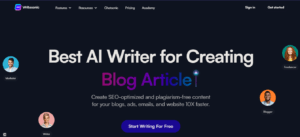
You must be tired of spending numerous hours producing the right copy for your content marketing plan as a marketer or freelancer. Are you interested in an SEO-friendly solution that could take care of everything for you in order to make your job 100 easier? Look no further than Writesonic, an AI writer and assistant who can assist you in elevating your marketing copy.

Writesonic is ideal for business owners or freelancers who need to rapidly and efficiently write interesting content without losing quality. Writesonic could be the missing piece in your armory, whether you’re a startup trying to enhance your internet presence or an established firm looking for a way to boost the reach of your advertising campaigns.
The tool provides AI-driven editing features like the Paraphraser, Expander, and Shortener to help you polish your blog post to perfection.

Chatsonic is Writesonic’s answer to ChatGPT. This AI-powered chatbot is capable of a wide range of functions, including answering hard inquiries and creating professional content. Text prompts allow users to communicate with Chatsonic.
Key features

- Writesonic generates high-quality content that is tailored to the user’s needs.
- Create blog articles that explain in detail about a topic you want to share with your audience.
- Create ecommerce product descriptions that are well-written, keyword-rich, and conversion-optimized.
- Various advertising and marketing tools can assist you in creating higher-performing ads across all channels, including Facebook, Google, and others.
- Website copy templates help improve overall conversion rates by ensuring all of the necessary elements are in place.
- The tool can be used for a variety of content types, including blog posts, social media posts, and product descriptions.
- Typically, the accuracy produced for various content topics is very high.
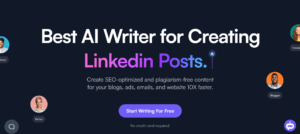
Pros
- User-Friendly: Writesonic’s intuitive interface ensures that it’s accessible to users of all skill levels.
- Speed and Reliability: Advanced AI algorithms enable Writesonic to produce email copy swiftly, with high accuracy and a natural tone.
- Creative and Versatile: It can generate email copy for various scenarios and offers multiple variations for each, allowing customization.
- Affordable and Scalable: Flexible pricing plans cater to different budgets and usage requirements.
Cons
- Limited Free Plan: While there is a free plan, it offers limited features and functionality compared to the paid plans.
- Requires Human Review: It isn’t a complete substitute for human writers; manual review and editing are necessary to ensure quality and relevance.
- Dependent on Internet Connection: As an online tool, Writesonic relies on a stable internet connection, which could pose challenges with slow or unstable connections.
Final Verdict
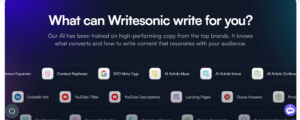
Overall, Writesonic is a highly effective AI business tool for helping companies and people alike simplify the content generation. The AI writing and editing tools, in addition to the AI-generated images, provide a wealth of attributes that can be incredibly helpful for someone looking to quickly and easily create great content.
Start with a Writesonic Free Trial!
💡 Related guide: 9+ Best SEO Software Tools of 2023 (Honest Reviews & Free Options)
3. Murf
Best AI Voice Generator Tool
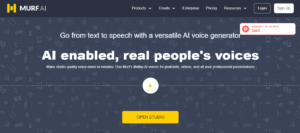
Topping our list of best AI tools for business is the text-to-speech generator Murf, which is one of the most popular and impressive AI voice generators on the market.
Murf is used by a wide range of professionals, including product developers, podcasters, instructors, and corporate leaders, to convert text to speech, voice-overs, and notes.
Murf provides a plethora of customization options to assist you in creating the most natural-sounding voices possible. It has a wide range of voices and accents to choose from, as well as a simple interface.
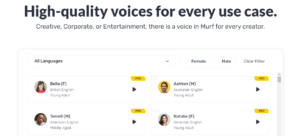
The text-to-speech app includes a comprehensive AI voice-over studio as well as a built-in video editor, allowing you to create a video with voiceover. There are over 100 AI voices available in 15 languages, with options such as Speaker, Accents/Voice Styles, Tone or Purpose.

Murf also has a voice changer feature that allows you to record without using your own voice as a voiceover. Murf’s voiceovers can also be customized in terms of pitch, speed, and volume. You can change the spelling or add pauses and emphasis.
Murf simplifies video voiceover creation, allowing businesses to add voice narration to social media content without having to record separate voiceovers.
Key Features of Murf AI:
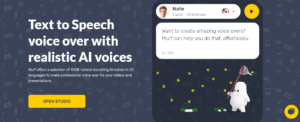
- Murf offers a diverse selection of over 100 AI voices from 15 languages, with customizable preferences for speaker, accents/voice styles, and tone/purpose.
- Users can sync voiceovers with video, music, or images, as well as adjust pitch, punctuation, and emphasis for more personalized messaging.
- A realistic voice changer is included to turn home recordings into professional voiceovers.
- Facilitates team collaboration, idea sharing, and content editing for generating quality voiceovers.
- Allows you to create custom pronunciations and share them with team members.
- Provides dependable and secure data protection via AWS hosting and encryption.
Pros
- User-friendly and flexible interface for quick and easy voiceover creation.
- Murf produces natural-sounding AI voices that are realistic and engaging.
- With various pricing plans suitable for businesses of all sizes, it provides affordability and scalability.
Cons
- Murf may not capture the nuances and emotions of human speech as effectively as a professional voice actor.
- Limited language and accent options for specific target audiences.
- May require additional editing and fine-tuning to achieve desired results.
Final Verdict
- Murf AI is a valuable tool for businesses seeking to create high-quality voiceovers efficiently and cost-effectively.
- Overall, Murf is recommended for those looking for a quick and easy way to incorporate voice narration into various content types, such as videos, podcasts, and online course platforms.
🔥 Get Started with MURF AI & Save Up to 33% ! 🔥
💡 Related guide: 13 Best AI Tools for Affiliate Marketing in 2023
4. Flick
Best Social Media Marketing Tool
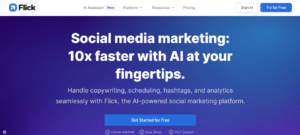
Flick AI Social Media Assistant is a powerful AI marketing tool that automates the process of brainstorming, writing, and planning social media content. You can experience a new way of creating engaging and on-brand content with ease by offering a 7-day free trial.
This AI-powered platform is a dynamic ally, providing AI Idea Brainstorming for completely unique concepts, AI Caption Writing for custom captions, and converting lengthy content into digestible pieces for sharing. It shines at post scheduling, allowing you to arrange and time your posts with a single click.
It also aids in impactful content management and visibility enhancement with features such as Auto-Suggested Hashtags and a Hashtag Search & Manager.
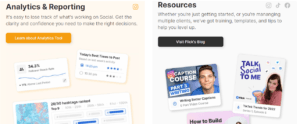
This tool, designed specifically for social media, provides 24/7 support and an easy setup process. Over 100,000 content creators, brands, and marketers rely on Flick AI Social Media Assistant to save time, boost performance, and increase their social media presence.
Flick AI Social Media Assistant is a powerful affiliate marketing tool designed to assist businesses in creating and managing their social media content using artificial intelligence.
Key Features
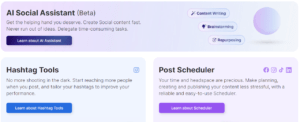
- Brainstorming: Generates original content ideas based on specified topics.
- Caption Writing: Crafts personalized, on-brand captions for social media posts.
- Repurposing: Transforms long-form content into bite-sized snippets for social media sharing.
- Planning: Offers content organization and scheduling capabilities.
- Hashtag Tools: Provides hashtag optimization and suggestion features.
- Analytics: Offers performance tracking and measurement tools.
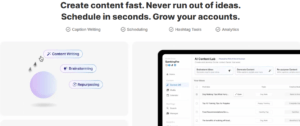
Pros
- Time-saving and content creation automation.
- Facilitates creative content ideas generation.
- Helps create engaging and persuasive captions.
- Supports content repurposing and scheduling.
- Enhances post discoverability through hashtag optimization.
- Enables performance monitoring and strategy optimization.
Cons
- Content generated by the AI may still require human review and editing.
- Understanding the audience, defining goals, creating value, and community engagement are still essential for social media success.
Final Verdict
- Flick AI Social Media Assistant is a top AI tool for businesses, offering streamlined social media content creation and management.
- Ideal for those seeking to improve social media workflow, productivity, creativity, online presence, and audience reach.
Overall, Flick AI emerges as a promising AI tool for business, offering valuable features to streamline content creation, scheduling, optimization, and planning across various social media platforms. It also simplifies hashtag selection, caption writing, and post performance tracking.

Flick is a smart choice for affiliate marketers, entrepreneurs seeking to save time, stay organized, and enhance their results. Additionally, the opportunity to earn recurring commission through referrals adds an attractive incentive.
All in all, Flick is a strong AI tool for business that can help grow your audience and income. Take advantage of the 7-day free trial to determine if it aligns with your goals. If it does, choose a plan that fits your budget and requirements.
Get Started with Flick Free Trial
💡 Related guide: 13 Best AI Email Writer & Generator Tools for 2023
5. Lovo AI
Best for Realistic Voice-over
The Role of AI in Modern Business

AI, or artificial intelligence, is a branch of computer science that focuses on developing machines and software that can perform human-like tasks.
AI plays a critical role in increasing business efficiency, productivity, customer satisfaction, and competitive advantage.
1. Data Analysis and Insights
- AI helps collect, process, and analyze vast amounts of data from diverse sources.
- AI generates insights and recommendations, aiding in identifying customer segments, predicting behavior, optimizing pricing, and detecting fraud.
- Example: Netflix uses AI to analyze user preferences and provide personalized recommendations.
2. Automation and Optimization
- AI automates and optimizes repetitive, complex, or tedious tasks and processes.
- It improves operational efficiency and cost reduction by finding optimal solutions for resource allocation, routing, scheduling, etc.
- Example: Amazon uses AI to automate warehouse operations like picking, packing, and shipping orders.
3. Customer Service and Engagement
- AI enhances customer service through natural language processing, speech recognition, chatbots, and virtual assistants.
- It helps understand customer needs and emotions, enabling personalized and relevant responses.
- Example: Domino’s uses AI to enable voice/text orders through its app or website.
4. Innovation and Creativity
- AI stimulates innovation by generating new ideas and products through machine learning, deep learning, GANs, etc.
- It enhances existing products/services by adding new features or functionalities.
- Example: Google employs AI to create products like Google Photos, Google Translate, and Google Duplex.
AI is no longer a sci-fi concept; it is a pillar of modern business.
Businesses that use AI gain a competitive advantage by automating tasks, making data-driven decisions, and improving customer experiences.
💡 Related guide: 27 Best & Highest-Paying AI Affiliate Programs in 2023
Importance of Utilizing AI Tools for Business

- AI tools for business utilize AI techniques like machine learning, natural language processing, computer vision, and speech recognition.
- These tools automate tasks, optimize processes, and provide insights across various business domains.
- They enhance efficiency, productivity, customer satisfaction, and competitive advantage.
Benefits of AI Tools for Business
AI tools for business enable businesses to:
Automate Tasks:
- Streamline repetitive and mundane tasks like data entry, invoicing, scheduling, and customer service.
- Saves time, reduces errors, and frees up human resources for strategic work.
Optimize Processes:
- Improve operations in areas such as supply chain management, inventory management, marketing, and sales.
- Enhances performance, cuts costs, increases revenue, and boosts customer loyalty.
Generate Insights:
- Extract insights from complex data sets like customer behavior, market trends, and industry patterns.
- Facilitates better decision-making, uncovers opportunities, and resolves problems.
Accessibility and Affordability
- Advances in AI technology, along with cloud computing and open-source platforms, have made AI tools more accessible and cost-effective for businesses.
Examples of AI Tools for Business
1. Chatbots:
- Interact with customers through natural language via text or voice.
- Provide information, answer queries, offer suggestions, and perform actions.
- Improve customer experience, increase engagement, and reduce human intervention.
2. Image Recognition:
- Identify and classify objects, faces, scenes, etc., in images.
- Utilized for security, quality control, product identification, and more.
3. Text Analysis:
- Extract meaning and information from textual data like documents, emails, social media posts.
- Applications include sentiment analysis, topic modeling, keyword extraction, summarization, etc.
4. Speech Recognition:
- Understand and transcribe spoken words into text.
- Applied in voice control, dictation, transcription, and other applications.
💡 Related guide: 13 Best AI Tools for Affiliate Marketing in 2023
Understanding AI Tools for Business

What Are AI Tools?
- AI tools encompass software applications and platforms that utilize artificial intelligence and machine learning to perform specific tasks.
- Artificial intelligence (AI) tools for business automate and improve various aspects of business operations.
- Reasoning, learning, decision making, natural language processing, computer vision, and speech recognition are all examples of AI tasks that require human-like intelligence.
- Data analytics, virtual assistants, and everything in between are examples of these tools.
Why Businesses Need AI Tools?
AI tools are increasingly essential in the modern business landscape.
These tools help businesses improve their efficiency, productivity, customer satisfaction, and competitive advantage.
Reasons Why Businesses Need AI Tools:
1. Automation of Repetitive Tasks
- AI tools can automate mundane and repetitive tasks, allowing resources to be allocated to creative and strategic work.
- Examples include handling customer service inquiries, data entry, scheduling, and invoicing.
2. Data Analysis and Decision Support
- AI tools excel at analyzing large datasets and providing valuable insights for informed decision-making.
- They help businesses understand customer behavior, preferences, needs, and feedback.
- AI tools optimize marketing campaigns, pricing strategies, and inventory management.
3. Enhancing Customer Experience and Loyalty
- AI tools contribute to improved customer experiences by providing personalized and relevant services.
- Examples include offering product recommendations, discounts, coupons, and rewards based on customer data.
- AI tools create chatbots, voice assistants, and virtual agents capable of natural language interactions.
4. Fostering Innovation and Creativity
- AI tools stimulate innovation and creativity by generating new ideas, solutions, and content.
- They assist in tasks like logo and slogan creation, design, video production, and problem-solving.
- AI tools help businesses identify new opportunities and trends.
Necessity of AI Tools for Business
- AI tools are not just beneficial; they are essential in today’s competitive market.
- Adopting AI tools provides businesses with a competitive advantage and accelerates goal achievement.
- Investment in AI tools is crucial for growth and success in the current business landscape.
Key Features to Look for in AI Business Tools
1. Relevance
- AI tools should align with the specific business problem or objective.
- For instance, if improving customer service is the goal, the tool should support natural language processing, sentiment analysis, and chatbot functionality.
- For optimizing marketing campaigns, the tool should perform data analysis, segmentation, personalization, and recommendation.
2. Accuracy
- AI tools should provide accurate predictions, recommendations, or actions.
- Accuracy relies on data quality and quantity, algorithm effectiveness, and feedback mechanisms.
- The business should measure and adjust the tool’s accuracy as necessary.
3. Scalability
- AI tools should be scalable to accommodate the evolving needs of the business.
- Scalability depends on architecture, performance, cost, and complexity considerations.
- The business should have the flexibility to scale the tool up or down based on requirements and budget constraints.
4. Security
- AI tools should ensure data security throughout collection, storage, processing, and transmission.
- Security measures encompass encryption, authentication methods, regulatory compliance, and ethical privacy policies.
- Protection against unauthorized access, misuse, or breaches is essential.
5. Usability
- AI tools should be user-friendly for the intended business users.
- Usability involves design, functionality, features, and user training and support.
- The business should be able to use the AI tool with ease and convenience.
Selecting AI tools for business requires careful consideration of their relevance, accuracy, scalability, security, and usability.
Choosing AI tools with these features empowers businesses to leverage AI effectively, transforming their operations and outcomes.
💡 Related guide: 27 Best & Highest-Paying AI Affiliate Programs in 2023
Top AI Tools for Business

AI-Powered Data Analytics Tools
As data analytics becomes more important in achieving business success, AI tools are becoming more popular and accessible.
Data analytics is the process of collecting, organizing, analyzing, and interpreting data in order to gain insights and make informed decisions.
A. Benefits of AI-Powered Data Analytics
1. Improved Accuracy and Efficiency
- AI tools automate data collection and analysis, reducing human errors and biases.
- They excel in handling large and complex datasets, performing advanced calculations, and generating accurate visualizations faster than humans.
2. Enhanced Customer Experience
- AI tools enable businesses to gain a deeper understanding of their customers by analyzing behavior, preferences, feedback, and sentiment.
- They provide personalized recommendations, offers, and solutions based on individual needs and interests.
3. Increased Innovation and Competitiveness
- AI tools help businesses uncover hidden patterns, trends, and opportunities within their data.
- They foster innovation by generating new ideas, products, and services based on data insights.
- AI tools help businesses adapt to evolving market conditions and changing customer expectations, staying ahead of competitors.
AI-powered data analytics enables businesses to harness the power of data, resulting in improved performance, increased customer satisfaction, and long-term growth.
B. Top AI Data Analytics Tools –
- AI tools for data analysis use artificial intelligence techniques to explore, visualize, and understand data.
- They automate tasks like data cleaning, preprocessing, modeling, and interpretation.
- AI-powered data analytics employs natural language processing, machine learning, and computer vision.
1. Tableau
- Prominent data visualization tool.
- Creates interactive dashboards and reports.
- Offers “Ask Data” for natural language data queries.
- Integrates with AI platforms like IBM Watson, Google Cloud AI, and Salesforce Einstein.
2. Microsoft Power BI
- Leading business intelligence platform.
- Imports data from various sources.
- Features “Q&A” for natural language queries.
- Utilizes AI for smart narratives, anomaly detection, and decomposition tree.
3. IBM Watson Analytics
- Cloud-based AI tool simplifies data analysis.
- Understands user queries via natural language processing.
- Provides guided data analysis and predictive analytics.
- Offers prescriptive analytics for data-driven recommendations.
4. RapidMiner
- End-to-end platform for data science and machine learning.
- Facilitates data preparation, modeling, validation, and deployment.
- Includes “Auto Model” for automated algorithm selection.
- Integrates with multiple data sources.
5. Google Cloud AutoML
- Enables custom machine learning model creation without coding.
- Utilizes neural architecture search technology.
- Offers specialized tools like AutoML Vision, Natural Language, Tables, and Video Intelligence.
6. KNIME
- Open-source AI tool with a graphical interface.
- Supports data analysis and machine learning workflows.
- Integrates with diverse data sources.
- Compatible with machine learning frameworks such as TensorFlow and scikit-learn.
7. H2O.ai
- Offers a suite of products for data science and machine learning.
- Includes H2O-3 (open-source), H2O Wave (web app framework), H2O Q (natural language interface), H2O Driverless AI (automated machine learning), and H2O MLOps (model management).
8. MonkeyLearn
- Specializes in text analysis and natural language processing.
- Creates custom text classifiers and extractors.
- Supports tasks like sentiment analysis, topic detection, and entity recognition.
- Integrates with various data sources.
9. Qlik Sense
- Combines data visualization and analytics.
- Creates interactive dashboards and reports.
- Features “Insight Advisor Chat” for natural language data queries.
- Utilizes AI for smart search, augmented intelligence, and conversational analytics.
10. Kanaries RATH
- Facilitates data visualization and dashboard creation without coding.
- Understands user queries through natural language processing.
- Allows customization of visualizations with various options.
- Supports multiple data sources.
These AI tools can automate data analysis processes, generate insights, and simplify decision-making.
By incorporating these tools into your business operations, you can improve data-driven decision-making and gain a competitive advantage.
2. AI-Enhanced Customer Relationship Management (CRM) Software
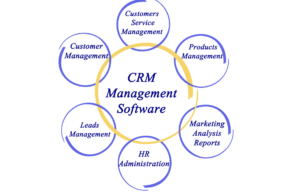
A. Transforming Customer Relations with AI
AI tools are changing the way businesses interact with their customers.
AI’s promising application in CRM software enhances customer interactions across channels and platforms.
Natural language processing, machine learning, computer vision, and other AI technologies are used in AI-enhanced CRM software to provide personalized, efficient, and intelligent solutions.
Benefits of AI-Enhanced CRM Software:
1. Improved Customer Satisfaction
- AI-enhanced CRM software understands customer needs, preferences, and emotions better than traditional CRM.
- Provides more relevant and timely responses, recommendations, and offers.
- Increases customer loyalty and retention.
2. Increased Sales and Revenue
- Identifies and targets potential customers.
- Optimizes pricing, discounts, and cross-selling/up-selling strategies.
- Predicts customer behavior and demand, adjusting marketing strategies accordingly.
3. Enhanced Productivity and Efficiency
- Automates repetitive tasks (e.g., data entry, email follow-ups, scheduling, report generation).
- Offers smart assistance and guidance to sales representatives, customer service agents, and managers.
- Reduces errors and saves time.
4. Better Decision Making
- Provides actionable insights and analytics.
- Supports data-driven decision-making.
- Offers forecasts and scenarios for planning and risk mitigation.
Current Adoption and Future Growth
- Many businesses are already embracing AI in CRM software.
- According to Salesforce, 51% of marketing leaders use AI in CRM, with 57% planning to do so in the next two years.
- AI is projected to increase global business revenues by $1.1 trillion by 2021.
Leading Providers of AI-Enhanced CRM Software
- Leading providers include Salesforce Einstein, Microsoft Dynamics 365 AI, Oracle CX Cloud Suite, Zoho CRM Plus, and HubSpot CRM.
- These platforms offer various features and functionalities tailored to diverse business needs and goals.
- AI tools are not only transforming customer relations but also fostering innovation and growth.
- Adopting AI-enhanced CRM software provides a competitive edge and enables exceptional customer experiences.
B. Best AI-Enhanced CRM Tools
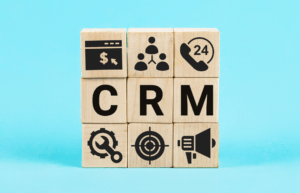
AI tools for business are gaining popularity and importance as they offer automation, improved customer relationships, and optimized sales processes.
AI-enhanced CRM (Customer Relationship Management) software is a type of CRM that leverages artificial intelligence to enhance its capabilities.
AI CRM offers numerous benefits to businesses, including:
- Improved Customer Satisfaction: AI CRM offers personalized interactions and relevant messaging, enhancing customer loyalty.
- Increased Sales Productivity: Streamlined workflows and error reduction result in more efficient sales operations.
- Enhanced Decision Making: Data-driven insights and recommendations aid in better decision-making.
- Boosted Innovation: AI CRM encourages experimentation and innovation.
- Competitive Advantage: Staying updated with the latest technologies and trends keeps businesses ahead of the competition.
There is a list of AI CRM tools with a focus on their features, pricing, reviews, and ratings. The following are the top 6 tools mentioned:
1. HubSpot CRM
- Offers a free plan with unlimited users, contacts, and features.
- HubSpot CRM is one of the leading issue-tracking software.
- AI features include chatbot builder, content assistant, ChatSpot, predictive lead scoring, and smart send times.
- Integrates with other HubSpot products and over 500 third-party apps.
- Praised for ease of use, functionality, customer support, and value for money.
2. Freshsales
- Provides a free plan with unlimited users, contacts, and features.
- Features Freddy (an AI-powered chatbot), lead scoring, sales forecasting, sales campaigns, and smartforms.
- Integrates with other Freshworks products and over 300 third-party apps.
- Users appreciate its user interface, features, customization, and customer service.
3. Pipedrive
- Offers a 14-day free trial and paid plans starting at $12.50 per user per month.
- Features “LeadBooster” (a chatbot), web visitors tracking, insights, smart contact data, and smart BCC.
- Integrates with over 200 third-party apps via Pipedrive Marketplace.
- Users value its simplicity, functionality, integrations, and support.
4. Zoho CRM
- Offers a free plan for up to 3 users and paid plans starting at $14 per user per month.
- Features Zia (an AI assistant), Zia Voice (voice-enabled interface), Zia Skills (skill-building platform), and more.
- Integrates with other Zoho products and over 300 third-party apps via Zoho Marketplace.
- Praised for versatility, features, customization, and pricing.
5. Zendesk Sell
- Provides a 14-day free trial and paid plans starting at $19 per user per month.
- Features Reach (lead generation), Sales Inbox (smart email), Sales Performance Dashboard, and more.
- Integrates with other Zendesk products and over 100 third-party apps via Zendesk Marketplace.
- Recommended for design, features, ease of use, and support.
6. ClickUp
- Offers a free plan with unlimited users and paid plans starting at $5 per user per month.
- Features NLP Task Creation, Machine Learning Priorities, Smart Search, Content Optimization, and Image Recognition.
- Integrates with over 1,000 third-party apps via ClickUp Integrations or Zapier.
- Praised for functionality, customization, collaboration, and value for money.
These tools are highlighted for their AI capabilities and their potential to assist businesses in various aspects of customer relationship management and sales optimization.
3. AI-Driven Marketing Automation Platforms

A. Revolutionizing Marketing with AI
AI tools are reshaping the marketing landscape, offering innovative solutions for various marketing tasks and enhancing overall efficiency and effectiveness.
Business AI tools are changing the way marketers create and deliver value to their customers. AI tools can assist marketers with a variety of tasks, including:
Content Creation
- AI tools are crucial in the creation of content for a variety of marketing channels, including blogs, social media, and emails.
- They create high-quality content and optimize it for SEO, readability, and audience engagement.
- Notable AI content creation tools include [Copy.ai], [Jasper], and [Phrasee].
Personalization
- Customer data and behavior analysis are used by AI tools to deliver highly personalized recommendations, offers, and messages.
- These tools segment customers based on their preferences, interests, and needs, allowing for more precise targeting.
- Leading AI personalization tools encompass [Optimizely], [Dynamic Yield], and [Personyze].
Analytics
- AI tools offer powerful analytics capabilities, allowing marketers to assess and improve campaign, channel, and strategy performance.
- They provide valuable insights and actionable recommendations to improve marketing ROI.
- Prominent AI analytics tools include [Google Analytics], [HubSpot], and [Oribi].
Revolutionizing Marketing with AI
- AI tools are revolutionizing marketing practices by enabling the creation of more relevant, engaging, and effective campaigns.
- Marketers benefit from time and cost savings as AI automates and streamlines various marketing processes.
- Leveraging AI tools provides a competitive advantage and allows marketers to deliver superior customer experiences.
B. Leading AI Marketing Automation Tools –
AI marketing automation tools use artificial intelligence to improve marketing efforts, deliver personalized experiences, and maximize ROI.
Leading AI Marketing Automation Tools:
1. HubSpot Marketing Automation:
- HubSpot offers a robust platform for content creation, lead generation, prospect nurturing, and performance measurement.
- Utilizes AI to provide insights, recommendations, and predictions for your marketing strategy¹.
2. Keap:
- Ranked as the top marketing automation tool for ease of use.
- Facilitates automation of email marketing, CRM, and sales processes.
- Uses AI to segment contacts, personalize messages, and optimize conversions¹.
3. Moosend:
- Serves various industries, including ecommerce and SaaS.
- Features email campaign creation, landing page design, and performance tracking.
- Leverages AI for workflow automation, audience segmentation, and product recommendations¹.
4. Zimplify:
- Employs AI to create and optimize landing pages, pop-ups, and forms.
- Focuses on lead generation, conversion rate optimization, and revenue growth.
- Analyzes visitor behavior, personalizes offers, and conducts A/B testing¹.
5. ManyChat:
- A chatbot platform for conversational marketing campaigns on platforms like Facebook Messenger, SMS, and email.
- Enhances audience engagement, lead qualification, and sales.
- Utilizes AI to comprehend natural language, provide relevant responses, and maintain follow-ups¹.
4. AI-Powered Chatbots and Virtual Assistants
A. Enhancing Customer Support with AI Chatbots – Learn how AI chatbots provide 24/7 customer support, answer queries, and improve user experiences.
B. Top AI Chatbot and Virtual Assistant Solutions – Compare AI chatbot solutions like IBM Watson Assistant, Dialogflow, and Intercom’s Resolution Bot.
Benefits of Using AI Tools for Business

AI tools offer numerous advantages for businesses, including:
- Efficiency: AI automates tasks, reducing manual work and improving overall operational efficiency.
- Data Analysis: AI can process vast amounts of data quickly, providing valuable insights for data-driven decision-making.
- Cost Savings: Automation and efficiency translate to cost savings in the long run.
- Customer Experience: AI-powered chatbots and personalization enhance customer experiences.
- Competitive Edge: Adopting AI can give your business a competitive advantage in your industry.
Improving Efficiency with AI
AI tools can significantly enhance efficiency in various aspects of your business, such as:
- Data Processing: AI algorithms can analyze data faster and more accurately than humans.
- Workflow Automation: Repetitive tasks can be automated, freeing up employees for more strategic work.
- Predictive Maintenance: In manufacturing, AI can predict when equipment requires maintenance, reducing downtime.
Success Stories: Businesses Leveraging AI

Case studies demonstrate AI’s transformative power in business. As an example:
Vistra: Powering Efficiency
- Vistra utilized an AI-powered heat-rate optimizer to increase efficiency by 1%.
- This translated into significant cost savings and a reduction in greenhouse gas emissions.
Wayfair: Navigating Challenges
- Wayfair leveraged AI to optimize logistics during the Covid-19 pandemic.
- The result? A remarkable 7.5% reduction in inbound logistics costs.
NuMedii: Accelerating Drug Discovery
- NuMedii’s AIID technology revolutionized drug discovery by analyzing complex data.
- It identifies new drug candidates for various diseases, accelerating research and development.
Syncthree: Elevating Sales and Revenue
- Syncthree employs AI-powered tools to boost client conversion rates.
- Tools like ChatGPT, LeadIQ, and HubSpot led to conversion rate increases of up to 300%.
AI Tools for Marketing and Sales

Marketing and sales benefit from AI in multiple ways:
1. Personalization
- Tailor content, messages, offers, and recommendations for each customer based on their behavior, preferences, and goals.
- Improve customer engagement, loyalty, satisfaction, and retention.
2. Automation
- Automate repetitive tasks, from data entry to lead generation, nurturing, and email marketing.
- Save time, reduce errors, and enhance productivity.
3. Optimization
- Optimize various aspects of campaigns, including targeting, segmentation, budgeting, bidding, pricing, and testing.
- Enhance the effectiveness and efficiency of marketing and sales strategies.
4. Insights
- Gain data-driven insights and actionable suggestions for improving marketing and sales performance.
- Forecast sales revenue, predict customer behavior, identify opportunities, and recommend best practices.
Use Cases of AI Tools for Marketing and Sales

1. Awareness
- Generate high-quality leads by reaching potential customers interested in your products or services.
- Example: HubSpot offers AI-powered marketing tools for content creation, SEO optimization, email campaigns, and social media management.
2. Consideration
- Qualify leads based on fit and interest.
- Example: HubSpot’s Predictive Lead Scoring assigns scores to leads, prioritizing the most promising prospects.
3. Decision
- Close deals with personalized and timely communication.
- Examples:
4. Retention
- Deliver exceptional customer service.
- Examples:
Best AI Tools for Marketing and Sales in 2024

Choose from these top-rated AI tools to enhance your marketing and sales efforts:
- HubSpot: All-in-one marketing platform for content, CRM, email, social media, SEO, automation, and more.
- ChatSpot: Conversational AI platform for personalized chatbot interactions and lead management.
- Gong: Conversation intelligence platform for recording, analyzing, and improving sales calls.
- Jasper.ai: Customer service platform for resolving issues efficiently.
- Evolv.ai: Optimization platform for improving website design and user experience.
- Writer: Writing assistant for creating clear, concise, and engaging content.
- SurferSEO: An SEO tool for data-driven insights and content optimization.
- Phrasee: AI-powered copywriting tool for engaging copy.
- Manychat: Chatbot builder for interactive and conversational experiences.
- Grammarly: Writing assistant for improving content quality.
AI Tools vs. Traditional Software

Comparing AI tools with traditional software reveals:
Features of AI Tools and Traditional Software
1. Learning
- AI Tools: Continuously learn and adapt without additional programming.
- Traditional Software: Operate based on fixed logic and parameters unless manually updated.
2. Data
- AI Tools: Depend on extensive data for learning and functioning.
- Traditional Software: Use data primarily for storing and retrieving information or predefined calculations.
3. Intelligence
- AI Tools: Exhibit human-like cognition, such as reasoning, problem-solving, and creativity.
- Traditional Software: Lack intelligence beyond their programmed instructions.
Benefits of AI Tools and Traditional Software
1. Efficiency
- AI Tools: Automate repetitive tasks, save time, and increase productivity.
- Traditional Software: Enhance efficiency by performing tasks faster and more accurately.
2. Effectiveness
- AI Tools: Elevate performance, quality, and outcomes by enhancing various business processes.
- Traditional Software: Provide reliable, secure, and scalable solutions to meet specific needs.
3. Innovation
- AI Tools: Foster creativity and generate new products, services, and experiences.
- Traditional Software: Enable access, sharing, and collaboration on information and resources.
Challenges of AI Tools and Traditional Software
1. Complexity
- AI Tools: More complex in architecture, design, and implementation, requiring significant resources and expertise.
- Traditional Software: Simpler in structure, functionality, and operation with established norms and regulations.
2. Reliability
- AI Tools: Less reliable in terms of consistency, predictability, and transparency, leading to potential unexpected results.
- Traditional Software: More reliable, producing consistent and precise results based on predefined rules.
3. Security
- AI Tools: More vulnerable in terms of security, privacy, and safety, posing risks like unauthorized access and errors.
- Traditional Software: More secure with measures like data encryption and backup systems.
Use Cases of AI Tools and Traditional Software
1. Healthcare
- AI Tools: Aid in disease diagnosis, treatment recommendations, patient monitoring, and drug discovery.
- Traditional Software: Manage medical records, appointments, and payments.
2. Education
- AI Tools: Personalize learning, assess students, provide feedback, and create content.
- Traditional Software: Deliver courses, manage classrooms, and communicate with students.
3. Finance
- AI Tools: Detect fraud, predict risks, optimize portfolios, and offer financial advice.
- Traditional Software: Process transactions, generate reports, and ensure compliance.
4. Retail
- AI Tools: Optimize pricing, recommend products, target customers, and enhance customer service.
- Traditional Software: Manage inventory, process orders, and track deliveries.
5. Entertainment
- AI Tools: Assist in creating music, movies, games, and art.
- Traditional Software: Support editing and distribution of entertainment content.
AI tools and traditional software each have their own set of features, benefits, and challenges. Traditional software provides reliability, simplicity, and security while AI tools provide innovation, adaptability, and complexity. Both play critical roles in a variety of industries and domains.
Depending on your business needs, embrace the future with AI tools or rely on the tried-and-true solutions of traditional software.
Comparing AI Tools by Business Function
Evaluate AI tools based on their suitability for specific business functions:
- Sales: Choose tools that excel in lead generation and conversion.
- HR: Look for AI tools that streamline recruitment and employee management.
- Finance: Select tools with robust financial analysis capabilities.
Now that we’ve covered the key aspects of AI tools for businesses, you’re well-equipped to make informed decisions and unlock success. Remember that the right AI tool can revolutionize your business operations, enhance customer satisfaction, and ultimately drive growth. Explore the possibilities and embark on your AI-powered journey today!
Implementing AI Tools in Your Business
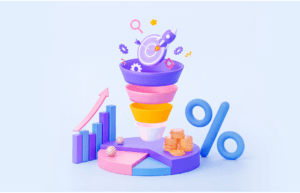
AI tools for business are a game-changer, but their seamless integration requires a strategic approach. Discover the steps to harness the power of AI successfully.
Step 1: Define Your Business Goals and Challenges
Know Your Destination
- Clearly define what you aim to achieve with AI tools.
- Identify the specific challenges or pain points in your business processes that AI can address.
- Determine if you want to generate leads, increase conversions, cut costs, or enhance customer retention.
Step 2: Research and Compare AI Tools
The Quest for the Perfect Fit
- Research the AI tools landscape using platforms like Unite.AI and Customers.ai.
- Dive into reviews, testimonials, case studies, and expert blogs to learn about AI tool features, benefits, and drawbacks.
- Consider factors like pricing, compatibility, scalability, security, and support.
Step 3: Test and Evaluate AI Tools
Putting AI to the Test
- Shortlist promising AI tools.
- Request demos or free trials to see how they perform in real-life scenarios.
- Gather feedback from potential users, employees, or customers.
- Evaluate based on performance, usability, reliability, accuracy, and impact on KPIs.
Step 4: Choose and Implement the Best AI Tool
Sealing the Deal
- Select the AI tool that aligns best with your goals and needs.
- Consult with the vendor or developer for installation, configuration, and integration guidance.
- Provide training to your team or customers on effective AI tool utilization.
- Continuously monitor and optimize AI tool performance.
Remember, AI implementation is an ongoing journey. Stay up-to-date with AI trends and keep innovating to maximize your business’s growth potential.
Future Trends in AI Tools for Business in 2024

As AI technology continues to evolve, staying ahead of the curve is essential for businesses looking to maintain a competitive edge. Here’s a glimpse into the future of AI tools for business:
A. Staying Ahead of the Curve
- AI-Powered Decision-Making: AI tools will become even more proficient in helping businesses make data-driven decisions, leading to improved efficiency and profitability.
- Personalization: AI-driven personalization will reach new heights, enabling businesses to deliver hyper-personalized experiences to customers.
- Automation: Automation will extend beyond routine tasks to complex decision-making processes, freeing up human resources for strategic activities.
B. Emerging Technologies and Their Impact
- Quantum Computing: The emergence of quantum computing will open up new possibilities for AI in solving complex problems at unprecedented speeds.
- AI in Healthcare: AI tools will play a crucial role in revolutionizing healthcare, from drug discovery to patient diagnosis and treatment.
- AI Ethics and Regulation: As AI adoption grows, there will be increased scrutiny and regulation to ensure ethical use and data privacy.
C. Preparing Your Business for the Future
To prepare your business for the future of AI tools:
- Continuous Learning: Invest in training and upskilling your workforce to keep up with evolving AI technologies.
- Data Management: Establish robust data management practices to harness the full potential of AI for insights and decision-making.
- Ethical Considerations: Stay informed about AI ethics and ensure your AI applications adhere to ethical guidelines and regulations.
Wrap-up
To summarize, the world of AI tools for business is vast and promising. You can harness the power of AI to propel your business to new heights by carefully considering your business goals, evaluating AI tools, and staying up to date on future trends.

Adopting AI tools is essential for staying ahead in today’s fast-paced business world. Finding the best AI tools for your business is all about tailoring the selection to your specific requirements. These tools are your ticket to innovation, whether they are for data analysis, customer engagement, or process automation.
The right AI tools can fuel your digital success, just as right web hosting services provide a solid online foundation. So, to thrive in the ever-changing online marketplace, mix and match wisely.
FAQ’s
Q. What are the top AI tools for business in 2024?
Here are some examples of AI tools that have won awards for their features, benefits, and applications:
- Pictory: is an AI video generator that can create and edit high-quality videos from text or PowerPoint files quickly and easily. Pictory also includes photorealistic AI avatars, auto-subtitles, and video summarization.
- Writesonic: An AI writing assistant capable of producing engaging and unique content for a variety of purposes, including blog posts, emails, marketing copy, social media captions, and more.
- 10WEB.IO: It is an AI website builder with a range of highly customizable templates and layouts to choose from.
- Murf: An AI text-to-speech app that can convert any text into natural-sounding voice-overs, dictations, or podcasts.
- LOVO.AI: It is an AI-powered voice generator and text-to-speech app that has won several awards. It is one of the most robust and user-friendly platforms for producing voices that sound like real human voices.
- HubSpot: A CRM platform that uses AI in marketing, sales, and customer service. It can assist you in creating personalized content, optimizing SEO, automating email campaigns and workflows, and generating social media captions, among other things.
- Descript: An AI-powered automation tool that can perform video and podcast editing with powerful AI capabilities. It costs only $2 per minute, and your task will be delivered within 24 hours.
Q. Which AI tools can help my business grow?
Some examples of AI tools that can help your business grow are:
- Customers.ai: It is an AI platform that can help you better understand your customers and provide personalized experiences across multiple channels.
- ChatGPT: An AI chatbot that can help you provide conversational support and engagement to your customers.
- Dall-E 2: is an AI image generator that can assist you in creating eye-catching visuals for your products or services.
- MidJourney: is an AI art generator that can assist you in creating one-of-a-kind and expressive artworks for your brand or business.
- InVideo: An AI video editor that can help you create professional and engaging videos for your marketing or communication purposes.
Q. Are there any AI tools that improve data analytics for businesses?
AI tools that improve data analytics for businesses include:
- Tableau: A data visualization tool that can help you create interactive dashboards and reports from various sources of data.
- Power BI: A business intelligence tool that can help you analyze and share data across your organization.
- Jupyter AI: A web-based tool that can help you perform data analysis and machine learning using various programming languages and frameworks.
- Polymer: An AI tool that can help you automate data collection and extraction from various sources such as websites, PDFs, emails, etc.
- MonkeyLearn: An AI tool that can help you perform text analysis and data extraction using machine learning models.
Q. What CRM software with AI capabilities is recommended for small businesses?
CRM software with AI capabilities can improve your CRM functions in the following ways:
- Based on customer data, providing insights and recommendations
- Automating tasks and workflows related to customer management
- Customizing and improving customer communication and engagement
- Predicting customer behavior and outcomes
CRM software with AI capabilities that is recommended for small businesses includes:
- HubSpot: A CRM platform that uses AI in marketing, sales, and customer service. It can assist you in creating personalized content, optimizing SEO, automating email campaigns and workflows, and generating social media captions, among other things.
- Zoho CRM: A CRM platform that includes Zia, an AI-powered assistant that can assist you with task and workflow management. It can assist you in data analysis, providing insights, automating actions, answering queries, and more.
- Salesforce: A CRM platform that includes Einstein GPT, an AI-powered tool for creating content and communicating with customers. Based on your real-time data, it can help you generate emails, conversations, offers, and so on.
- Pipedrive: A CRM platform that includes Sales Assistant, an AI-powered tool for optimizing sales performance. It can assist you in prioritizing leads, tracking activities, providing insights, and much more.
- Freshworks: A CRM platform that includes Freddy AI, an AI-powered tool that can help you improve your customer experience. It can assist you in providing interactional support, automating workflows, segmenting customers, and much more.
Q. How can AI-driven marketing automation tools benefit my company?
Marketing automation tools assist you in automating and streamlining your marketing processes and campaigns. AI-powered marketing automation tools can help your business by:
- Reducing manual tasks and errors saves time and resources.
- Improving efficiency and effectiveness through strategy and performance optimization
- Increasing personalization and relevance by tailoring content and offers to customer preferences
- Increasing creativity and innovation through the generation of new ideas and solutions
Q. Which AI chatbot solutions are best for enhancing customer support?
AI chatbot solutions for improving customer service include:
Q. What are the key features to look for when selecting AI tools for business?
Important features when selecting AI tools:
- Relevance and applicability
- Ease of use and accessibility
- Quality and reliability
- Support and maintenance
Examples of AI tools with these features:
Q. Can you recommend AI tools that can integrate with my existing systems?
Ways to integrate AI tools with existing systems:
- Through APIs
- Via plugins or extensions
- Using cloud or web-based solutions
AI tools that can be integrated with your existing systems include:
Q. Are there any discounts or promotions on AI tools for businesses right now?
Here are some examples of current discounts or promotions on AI tools for businesses:
- DeepBrain: It’s an AI video creation platform with photo-realistic AI avatars and voice-overs. New users can try it for free with a limit of three videos. There’s also a 50% discount on the first month of paid plans with a specific coupon code.
- Linguix: This is an AI-powered writing assistant. It helps improve writing skills, grammar, spelling, and vocabulary. New users can get a 40% discount on the annual premium plan when signing up through a provided link.
- MonkeyLearn: An AI-powered text analysis platform that assists in extracting insights from text data using pre-trained or custom models. New users can test its features and capabilities with a 14-day free trial.
- Replika: It is an AI-powered chatbot that serves as a companion, friend, or therapist. It offers a free plan for unlimited conversations and a pro plan at $7.99 per month or $47.99 per year, unlocking additional features like voice calls and role-playing.
- TensorFlow: TensorFlow is an open-source machine learning framework. It allows users to build and deploy AI models for various applications. It offers free online courses and tutorials suitable for both beginners and experts looking to learn and use TensorFlow.
Q. What is the ROI of implementing AI tools in a small business?
Some of the general advantages that AI tools can provide for small businesses are as follows:
Increasing Efficiency and Productivity:
- Automation of repetitive tasks
- Streamlining workflows
- Reducing errors
- Saving time and resources
Improving Accuracy, Consistency, Creativity, and Performance:
- Enhancing product, service, or process quality
- Fostering innovation
Increasing Customer Satisfaction and Loyalty:
- Providing personalized solutions
- Offering relevant recommendations
- Delivering timely feedback
- Addressing customer needs and preferences
Gaining Competitive Advantage and Market Share:
- Differentiating from competitors
- Attracting new customers
- Retaining existing customers
- Expanding into new markets or segments
To determine the ROI of implementing AI tools in a small business, consider the following 5 steps:
1. Identify Goals and Objectives:
Define the specific business goals you aim to achieve with AI, such as sales growth, cost reduction, improved customer service, or lead generation.
2. Select Suitable AI Tools:
Choose AI tools that align with your business needs and goals, such as AI chatbots for customer service, AI video creation tools for marketing, or AI analytics tools for data analysis.
3. Estimate Costs and Benefits:
Evaluate the financial aspects, including initial investment costs, ongoing operational expenses, potential revenue increase, cost savings, and the overall value added by integrating AI tools.
4. Compare with Alternative Scenarios:
Analyze how using AI tools compares to not using them, considering the potential revenue loss, additional costs incurred, or missed opportunities for value creation in the absence of AI.
5. Calculate ROI Ratio:
Determine the Return on Investment (ROI) by dividing the net benefits (benefits minus costs) by the costs associated with using AI tools. This quantifies the financial impact and efficiency of your AI integration effort.


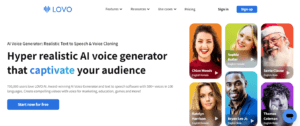


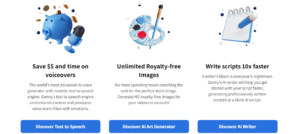




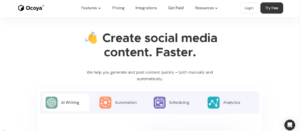
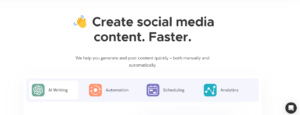

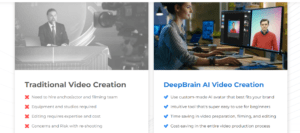



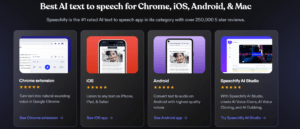





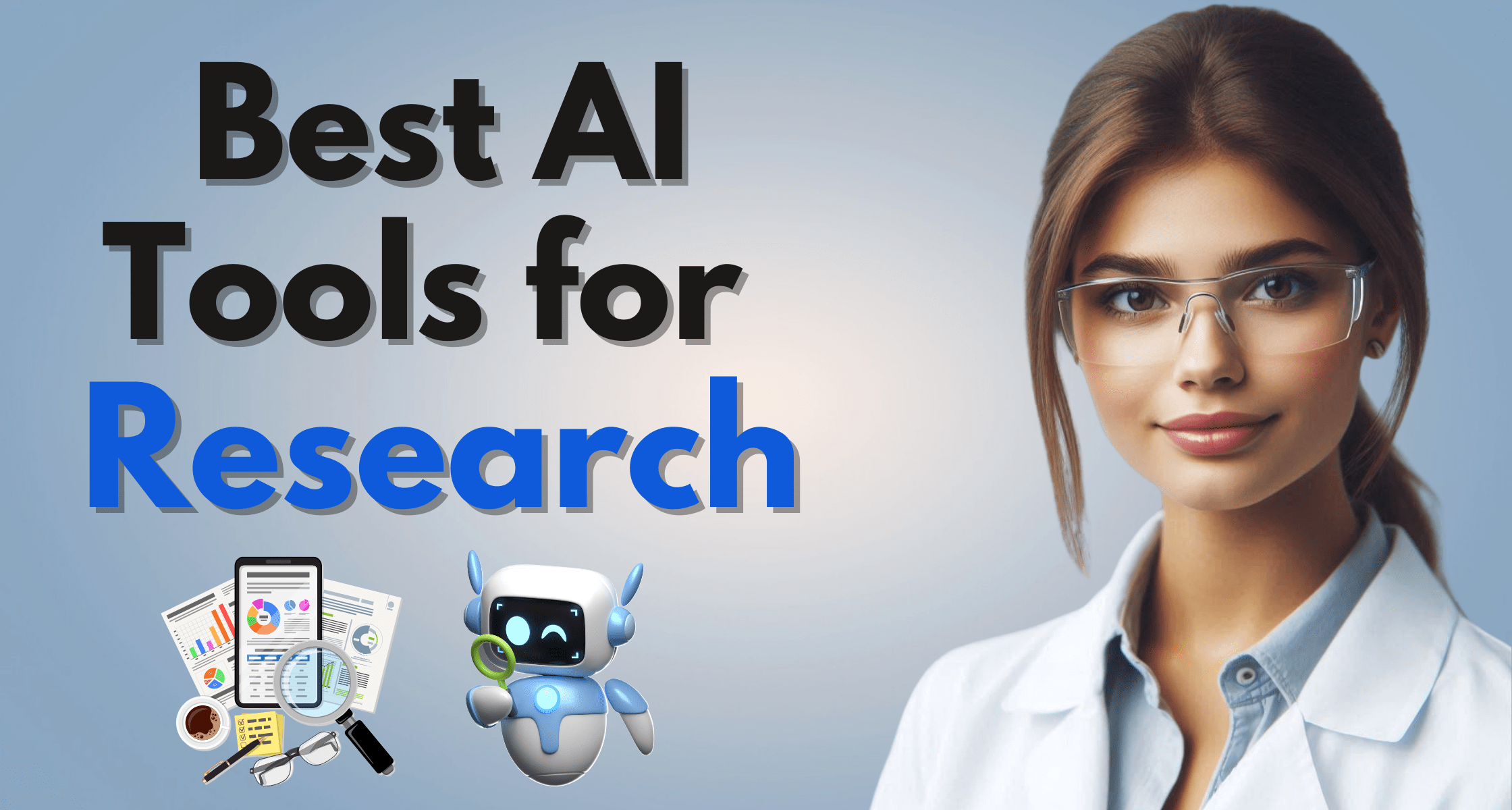


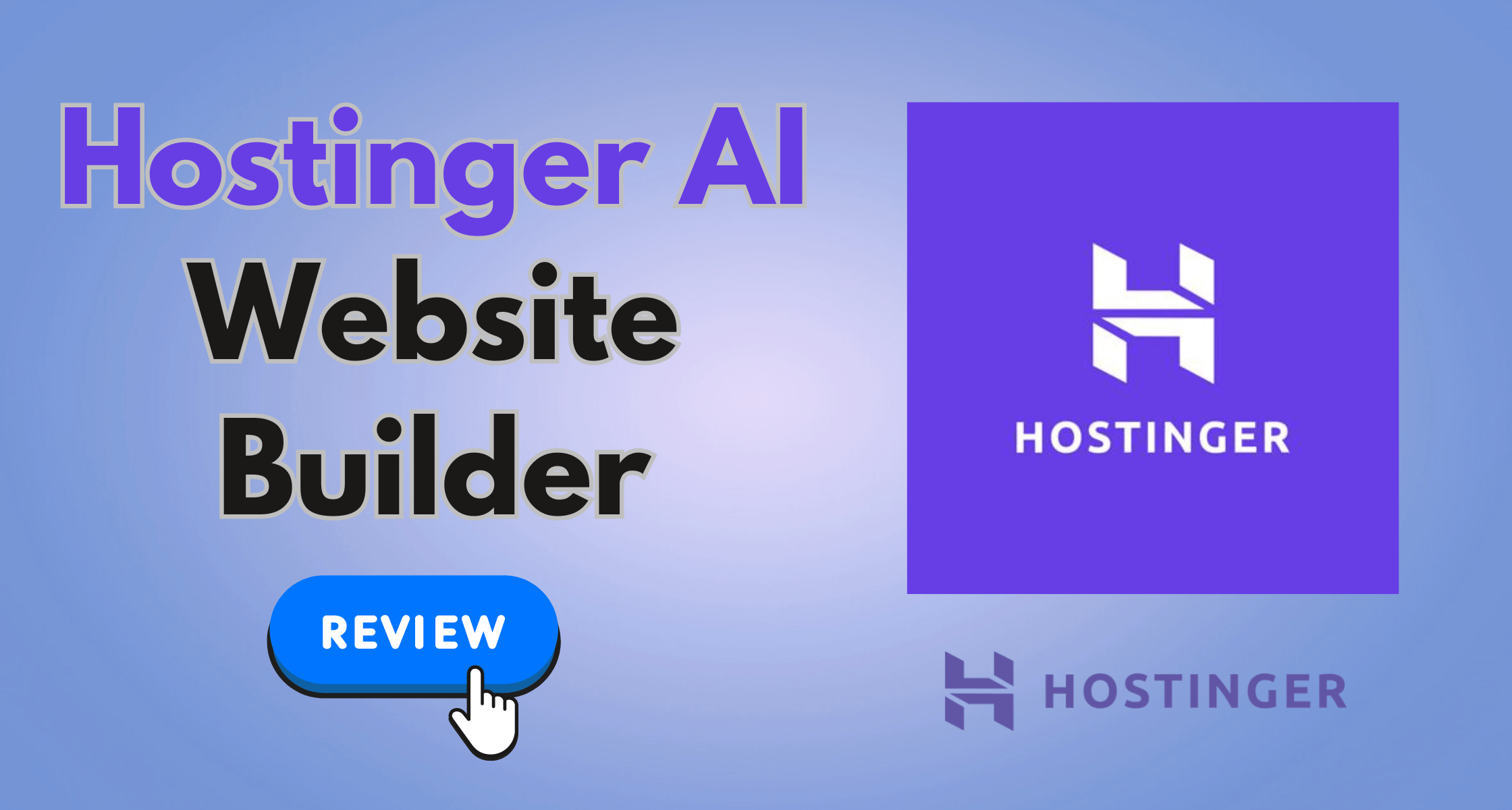
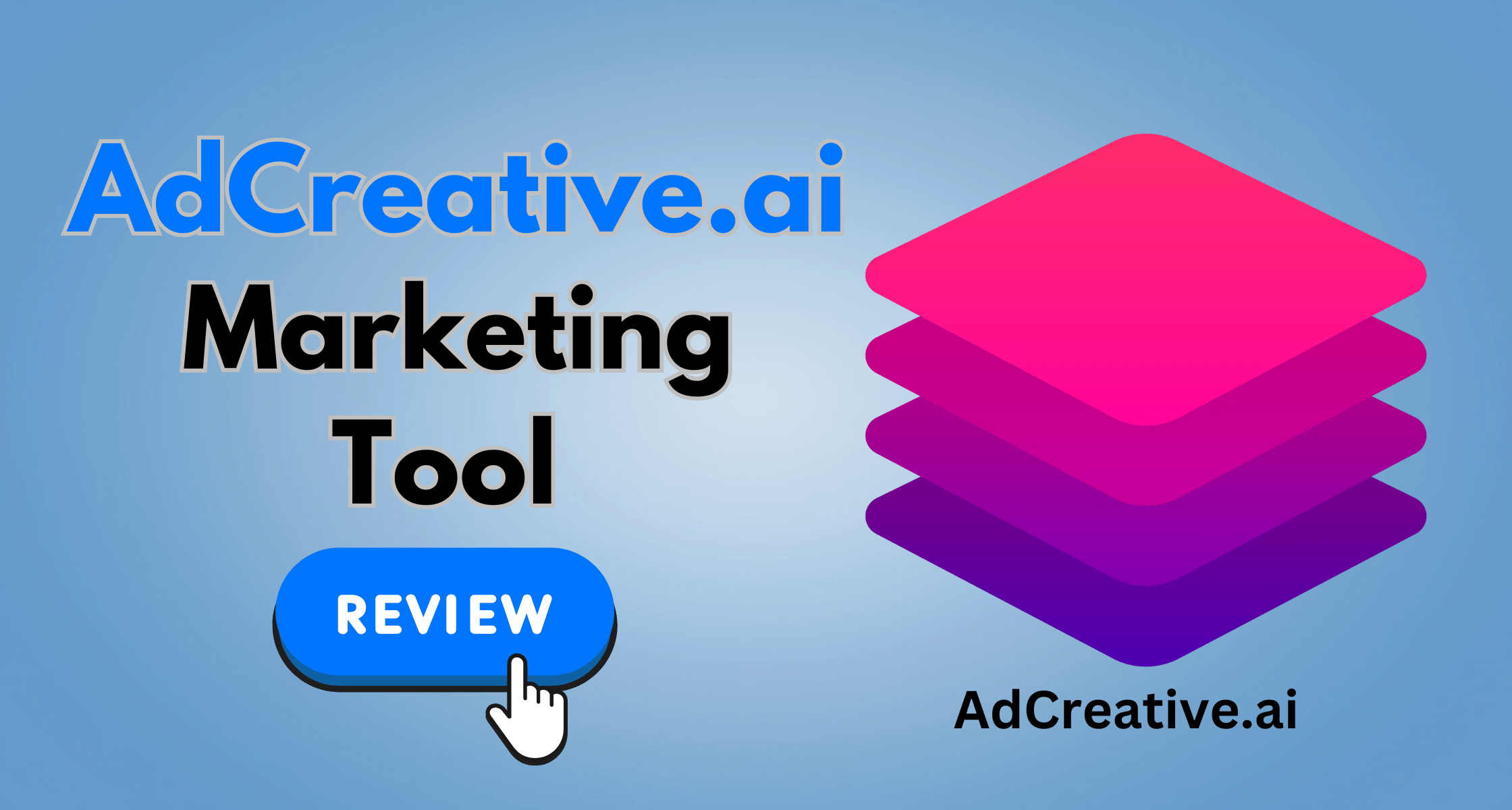
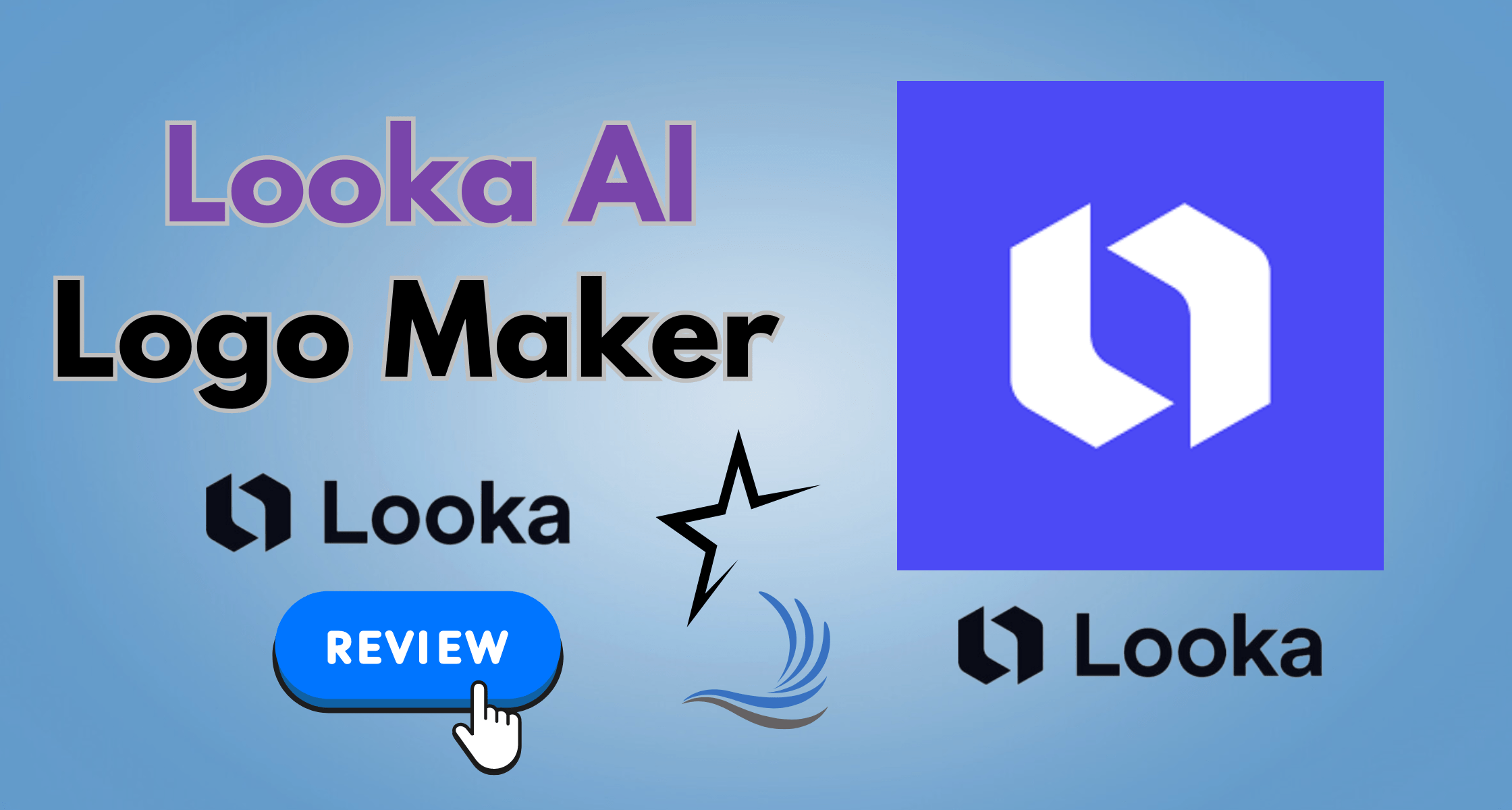

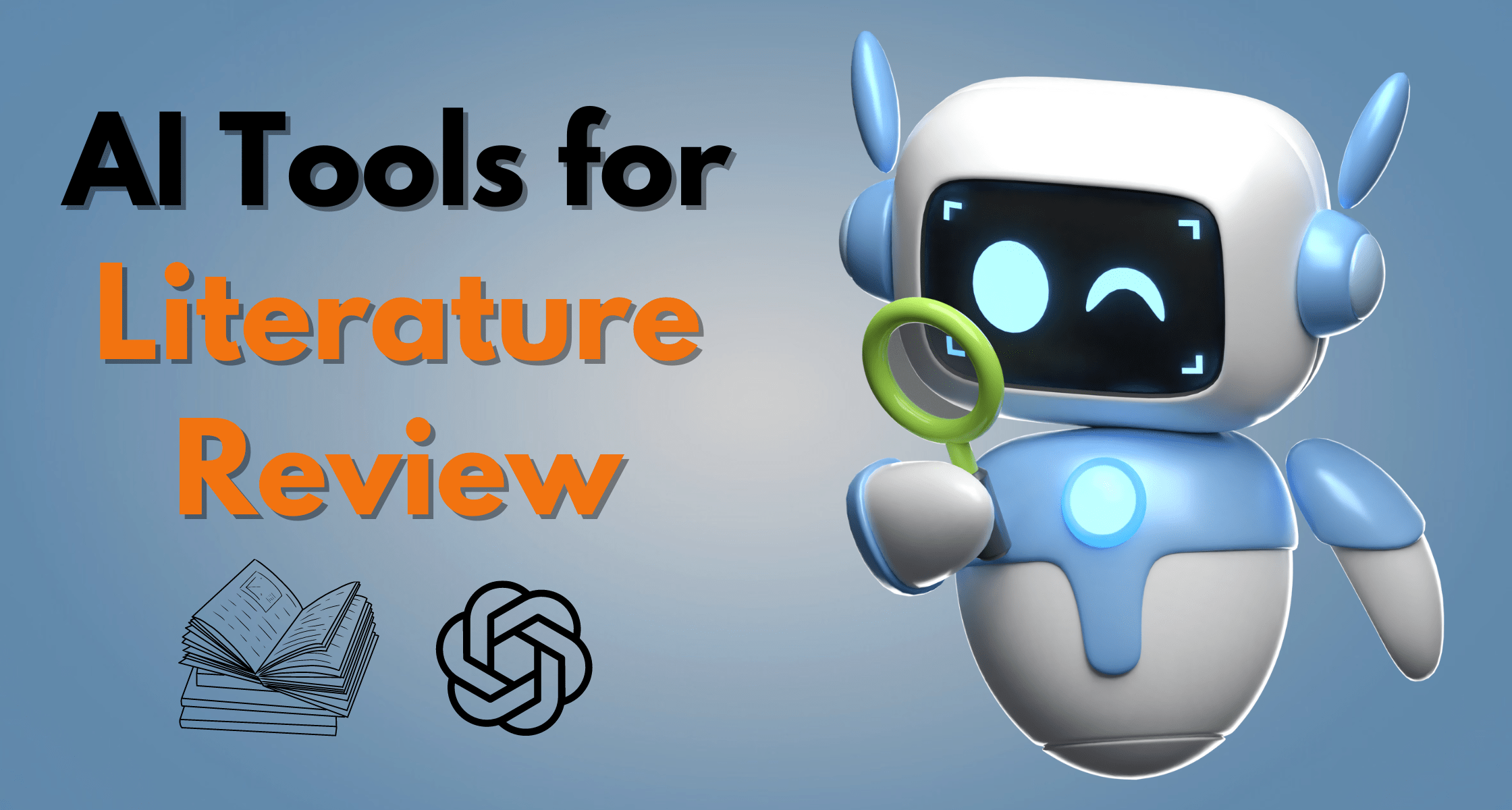

[…] paraphrasing tools, AI social media schedulers, AI SEO content analyzers, AI recruiting tools, and AI tools for business are all part of […]
[…] in creating, promoting, and measuring content that is relevant to your audience. It is one of the best ai tools for business available on the […]
[…] a powerful and versatile AI tool for businesses, facilitating the conversion of text into natural-sounding […]
gamble license curacao gaming license search.
[…] integrate with various services and platforms, such as email marketing tools, ai marketing tools, ai business tools, social media platforms, loyalty programs, […]
[…] See also 13 "Best" AI Tools for Business in September 2023 (Free & Paid) […]
[…] is one of the best AI tools for businesses looking for efficient and cost-effective AI video creation from […]
[…] Best AI Tools for Business in September 2023 […]